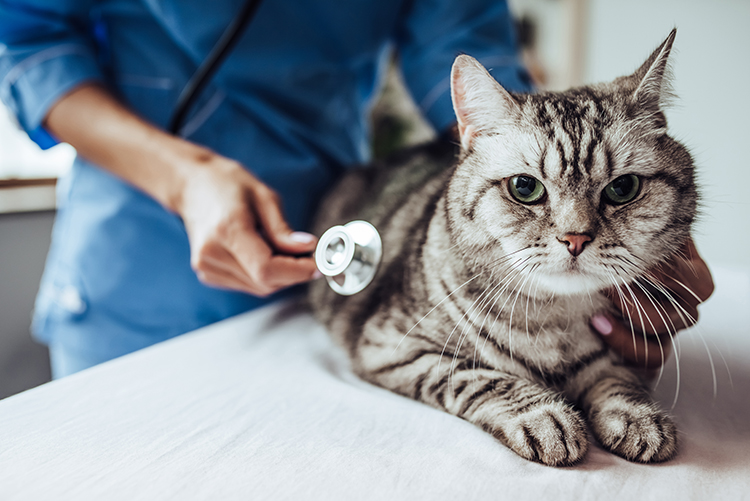Helping veterinarians manage stress and burnout
Helping veterinarians manage stress and burnout

Like many veterinary students, Dr. Addie Reinhard went from the protective environment of veterinary school into a clinical practice. She was not prepared for all the stress shifting to the professional world would bring, and it severely curtailed the joy she felt in taking care of people’s pets.
“We do what we do to help the people who own the animals, who love the animals and to promote that human-animal bond. I think that when there are things that occur in a practice that prevent us from achieving that, whether that be limitations in finances or limitations in our own skills, it weighs on us,” she said.
Reinhard said there were a lot of challenges when she started her career.
“You’re going from being a student, where you have lots of checks and a lot of people above you that are making sure all your pets are good, to having full responsibility for your patients. That was tough.”
Large caseloads and working in a high stress environment can sometimes overwhelm young veterinarians. Add to that, veterinarians often have a high student debt-to-income ratio, so for some young doctors, it’s hard to live comfortably right out of school.
“We deal with a lot of situations that are really tough. There are a lot of ethical decisions vets have to deal with every single day, and a lot of it ties to money and (clients’) finances,” Reinhard said. “Those issues weighed pretty heavily on me. I experienced my own burnout two or three years into practice. I was exhausted. There was a lot of emotional toll.”
When Dr. Reinhard looked for some resources to help, she didn’t find much. She started looking at other career opportunities within the veterinary profession, public health, teaching or research. She decided to enroll in graduate school at the University of Kentucky to work on a master’s degree in community and leadership development, a degree offered by the College of Agriculture, Food and Environment.
“I wanted to create a program to support veterinarians that were feeling burned out and overwhelmed,” she said.
The program she created during her UK graduate studies was a mentorship program that included leadership and professional skills training. Seven graduates from Lincoln Memorial University and the University of Tennessee colleges of veterinary medicine, participated in the online pilot program she designed with knowledge she gained from earning the University of Tennessee Veterinary Human Support Certificate and through her advanced leadership training in the UK Department of Community and Leadership Development.
“A lot of it (my program) was about self-care, but a lot of it was about leadership and how to work through ethical dilemmas, how to be prepared for working with clients with limited incomes and how to feel good about it at the end of the day and not feel like you’re a failure. And also conflict, how to work through conflict, because that is common in vet practices,” Reinhard said.
Program participants met on Zoom once a month to discuss their experiences in transitioning to practice, connect with other early-career professionals and hone their professional skills.
“Those meetings served as an opportunity for them to feel like they weren’t alone in practice and feel like, oh, other people are going through similar things as me,” Reinhard said. “Often that can be very beneficial at promoting mental health, that social support aspect, knowing that other people are going through similar struggles and challenges.”
Before the program started, the average burnout level of all the newly graduated veterinarians in the study was higher than the burnout levels of the general population. When Reinhard evaluated her study, she found that average exhaustion and cynicism levels – two measures of burnout – decreased over time in veterinarians who had gone through her program, while they significantly increased in veterinarians who were part of the control group and did not participate in the program.
“The encouraging thing was, this program has the potential to prevent that (burnout) from occurring, to prevent that from getting much worse,” she said. “We know that all of these measures, burnout, well-being, stress, they’re bad for all veterinarians, no matter what the age, but they’re worse for our young veterinarians. The first five to 10 years is the time for the poorest well-being. I think, after you’ve been in practice five, 10 years, you begin to adapt – and I even noticed this transition within myself when I was practicing – you begin to understand and adapt to some of those challenges.”
Dr. Reinhard is hoping to continue growing the program, because she sees a real need for something like this. The latest study by the Centers for Disease Control and Prevention found that suicide is 1.6 to 2.4 times more likely among veterinarians than among the general public.
“Suicide is a very complex issue, so there’s not just one thing that creates this issue,” Reinhard said. “I’ve been getting more involved with the suicide piece of this. I’ve been doing suicide intervention training with Southeast Center for Agricultural Health and Injury Prevention, so that’s been an exciting thing.”
Now graduated, she has been invited to be on the research team for the third phase of the Merck Animal Health Veterinary Wellbeing Study. Merck Animal Health has done two previous national surveys of veterinary mental health, and they are currently performing another survey to track trends in mental health and well-being within the veterinary profession.
Dr. Reinhard said that anyone with questions about her program can contact her at addiereinhard@gmail.com.
Community & Leadership Development Veterinary Science



